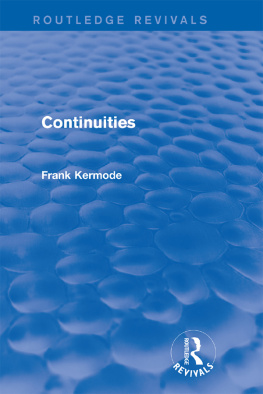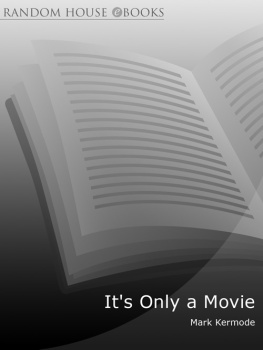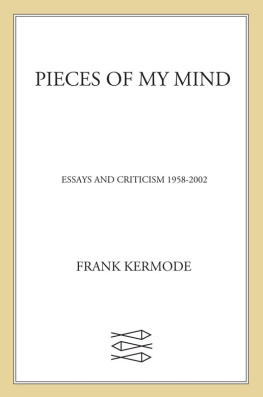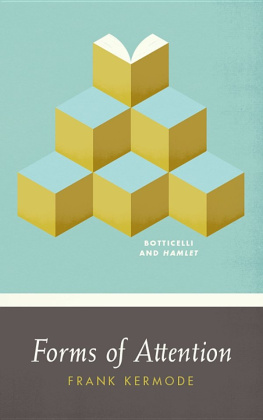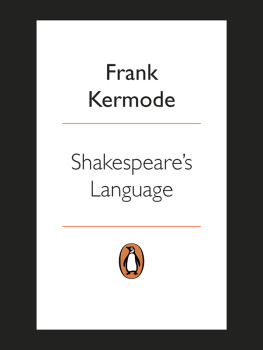THE SENSE OF AN ENDING
STUDIES IN THE THEORY OF FICTION
Time cannot exist without a soul
(to count on it).
ARISTOTLE
a more severe,
More harassing master would extemporize
Subtler, more urgent proof that the theory
Of poetry is the theory of life
As it is, in the intricate evasions of as,
In things seen and unseen, created from nothingness,
The heavens, the hells, the worlds, the longed-for lands.
WALLACE STEVENS
The Sense of an Ending
STUDIES IN THE THEORY OF FICTION
with a New Epilogue
Frank Kermode


Oxford New York
Athens Auckland Bangkok Bogot Buenos Aires Calcutta
Cape Town Chennai Dar es Salaam Delhi Florence Hong Kong
Istanbul Karachi Kuala Lumpur Madrid Melbourne Mexico City
Mumbai Nairobi Paris So Paulo Singapore Taipei Tokyo
Toronto Warsaw
and associated companies in
Berlin Ibadan
Copyright 1966, 1967, 2000 by Oxford University Press, Inc.
First published by Oxford University Press, New York 1967
First issued as an Oxford University Press paperback, 1968
by Oxford University Press, Inc.,
198 Madison Avenue, New York, New York 10016
Oxford is a registered trademark of Oxford University Press
All rights reserved. No part of this publication
may be reproduced, stored in a retrieval system, or transmitted,
in any form or by any means, electronic, mechanical,
photocopying, recording, or otherwise, without the prior
permission of Oxford University Press.
Library of Congress Cataloging-in-Publication Data
Kermode, Frank, 1919
The sense of an ending : studies in the theory of fiction : with a
new epilogue / Frank Kermode. [New ed.]
p. cm.
Lectures delivered as the Mary Flexner Lectures, Bryn Mawr
College, fall 1965, under the title The long perspectives.
Includes bibliographical references
ISBN 0-19-513612-8
1. LiteraturePhilosophy. I. Title.
PN45.K44 2000
801dc21 99-43613
1 3 5 7 9 8 6 4 2
Printed in the United States of America
IN MEMORIAM
J.P.K.
18941966
TABLE OF CONTENTS
PREFACE
THIS BOOK consists of the Mary Flexner Lectures given at Bryn Mawr College in the fall of 1965. Having honoured me by the invitation to deliver them, the College increased my debt beyond the possibility of repayment by its hospitality during the six weeks of my stay. To the President, the Faculty, and the students (who contributed so much in discussion) I therefore make this inadequate gesture of gratitude, and I know that none of them will feel slighted if I specially mention the sense of obligation my wife and I feel toward Mary Woodworth.
There are also debts contracted earlier; that I own them but briefly makes them no smaller, nor the sequel better able to satisfy the creditors. Much of the preliminary reading, thinking, and talking was done during an idyllic stay at the Center of Advanced Studies, Wesleyan University. Paul Horgan, the Director, I think, needs no assurance of my affection and gratitude; nor do my friends on the Wesleyan faculty. Two other friends I must mention, because they struggled with and improved early drafts: R.J. Kauffman of Rochester University, and J.B. Trapp of the Warburg Institute.
The purpose of the book being rather to make suggestions, to initiate discussion, than to settle any of the problems it raises, I found myself in some difficulty when I came to prepare it for the press. I had originally intended to write long notes and appendices, partly to acknowledge more fully the influence of certain books, and refer to many others which had perhaps affected the course of my thinking, but dropped out of the argument. Now I see that this would probably diminish whatever penetrating force these explorations may have, and that my best policy was rather to keep notes to a minimum, and conduct any secondary inquiries that I am capable of in some other place. I have therefore revised the text without much substantive alteration; the lectures are a little longer than they were, but stand here much as they were when I delivered them at Bryn Mawr in October and November 1965. The title of the series was originally The Long Perspectives. I hope that the change is approved at Bryn Mawr.
THE SENSE OF AN ENDING
I The End
... then the Last Judgment begins, & its Vision is Seen by the Imaginative Eye of Every one according to the situation he holds.
BLAKE
we can only
Walk in temperate London, our educated city,
Wishing to cry as freely as they did who died
In the Age of Faith. We have our loneliness
And our regret with which to build an eschatology.
PETER PORTER
IT is not expected of critics as it is of poets that they should help us to make sense of our lives; they are bound only to attempt the lesser feat of making sense of the ways we try to make sense of our lives. This series of talks is devoted to such an attempt, and I am well aware that neither good books nor good counsel have purged it of ignorance and dull vision; but I take comfort from the conviction that the topic is infallibly interesting, and especially at a moment in history when it may be harder than ever to accept the precedents of sense-makingto believe that any earlier way of satisfying ones need to know the shape of life in relation to the perspectives of time will suffice.
You remember the golden bird in Yeatss poemit sang of what was past and passing and to come, and so interested a drowsy emperor. In order to do that, the bird had to be out of nature; to speak humanly of becoming and knowing is the task of pure being, and this is humanly represented in the poem by an artificial bird. The artifice of eternity is a striking periphrasis for form, for the shapes which console the dying generations. In this respect it makes little differencethough it makes somewhether you believe the age of the world to be six thousand years or five thousand million years, whether you think time will have a stop or that the world is eternal; there is still a need to speak humanly of a lifes importance in relation to ita need in the moment of existence to belong, to be related to a beginning and to an end.
The physician Alkmeon observed, with Aristotles approval, that men die because they cannot join the beginning and the end. What they, the dying men, can do is to imagine a significance for themselves in these unremembered but imaginable events. One of the ways in which they do this is to make objects in which everything is that exists in concord with everything else, and nothing else is, implying that this arrangement mirrors the dispositions of a creator, actual or possible:
... as the Primitive Forms of all
(If we compare great things with small)
Which without Discord or Confusion lie,
In that strange Mirror of the Deitie.
Such models of the world make tolerable ones moment between beginning and end, or at any rate keep us drowsy emperors awake. There are other prophets beside the golden bird, and we are capable of deciding that they are false, or obsolete. I shall be talking not only about the persistence of fictions but about their truth, and also about their decay. There is the question, also, of our growing suspicious of fictions in general. But it seems that we still need them. Our povertyto borrow that rich concept from Wallace Stevensis great enough, in a world which is not our own, to necessitate a continuous preoccupation with the changing fiction.
Next page

